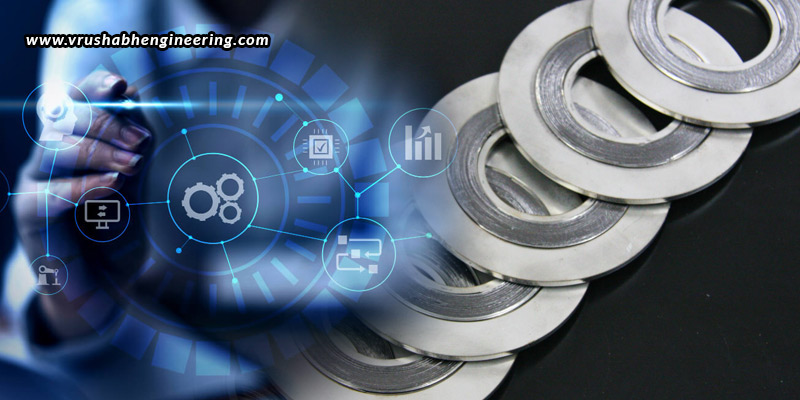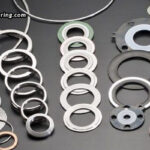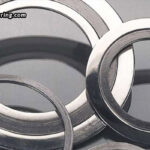In industrial settings, safety and operational uptime are essential factors that significantly affect productivity, compliance with regulations, and overall profitability. Among the various elements that impact these factors, gaskets are crucial for ensuring leak-free operation in high-demand applications. Choosing the appropriate gasket for your system goes beyond mere sealing; it involves safeguarding personnel, protecting equipment, and reducing expensive downtime. This blog delves into the significance of selecting the right gasket, how spiral wound metallic gaskets contribute to preventing leaks and failures, and the best practices for enhancing safety and maintaining operational continuity.
The importance of gasket selection for safety
Although gaskets are relatively small components, their failure can lead to disastrous outcomes. Leaks of hazardous fluids or gases can create severe risks to personnel safety, including burns, poisoning, explosions, or fire hazards. They can also negatively impact the environment, as leaking chemicals or oil can lead to contamination and result in regulatory fines. Furthermore, inadequate sealing can cause equipment damage due to corrosion, erosion, and premature wear of expensive machinery. Operational downtime is another significant issue, as unexpected shutdowns for leak repairs or gasket replacements lead to productivity declines and financial losses. Selecting the right spiral wound metallic gasket is essential for mitigating these risks by ensuring reliable sealing performance under operational pressures.
Key factors in spiral wound gasket selection
Selecting the right gasket involves evaluating pressure, temperature, media, and flange design. The key factors to consider are:
- Gasket construction and design
The effectiveness of a spiral wound metallic gasket is affected by various factors, including the quantity of metal and filler layers, the presence of inner and outer rings, and the total thickness of the gasket. Inner rings are essential for preventing blowout in high-pressure situations, whereas outer rings safeguard flanges and aid in proper alignment during installation. The arrangement of layers influences the gasket’s flexibility and its ability to evenly distribute load across the sealing surface. When designed properly, these components collaborate to minimize stress points and improve safety in high-pressure environments.
- Pressure and temperature ratings
Spiral wound metallic gaskets are designed to operate effectively across a broad spectrum of pressures and temperatures. For applications with low to medium pressure, stainless steel windings combined with graphite fillers are typically utilized, whereas high-pressure situations often necessitate the use of Inconel or Monel windings along with flexible graphite fillers. In scenarios involving high-temperature steam, graphite fillers that can endure temperatures above 1000°C are preferred. To guarantee reliability and safety, it is crucial to align the gasket rating with the maximum anticipated operational conditions, factoring in possible pressure spikes and thermal fluctuations.
- Chemical compatibility
Gaskets must withstand degradation from the fluids they encounter to ensure reliability and safety. Graphite fillers are particularly effective for high-temperature and chemically aggressive fluids, while PTFE fillers are best suited for corrosive chemicals where non-reactivity is essential. To enhance durability, metal windings made from corrosion-resistant alloys like 316L stainless steel or Inconel offer protection against chemical damage. Selecting the appropriate material combination is vital for maintaining long-term sealing integrity and consistent performance in challenging environments.
- Flange compatibility
Effective sealing is also significantly influenced by the type of flange utilized. Raised face flanges are commonly used in most industrial settings, while ring-type joint flanges require precise inner ring sizing for optimal function. In situations involving custom or uneven flanges, flexible fillers may be necessary to adapt to surface irregularities. A thorough understanding of flange design is critical to avoid problems such as gasket blowout, extrusion, and leaks, thereby ensuring dependable and durable sealing performance.
Common risks of incorrect gasket selection
Using an inappropriate gasket can result in various operational issues:
- Leakage: Even minor leaks can develop into significant incidents, jeopardizing safety and efficiency.
- Premature failure: Mismatched materials or faulty design may lead to the gasket crushing, cracking, or delaminating, causing early malfunction.
- Frequent maintenance: The need to replace failed gaskets more frequently increases downtime, labour demands, and operational expenses.
- Safety hazards: Leaking fluids or gases can pose risks to workers, damage machinery, and negatively impact the environment.
These risks underscore the importance of proper gasket selection as a vital component of process safety management, ensuring reliability, reducing costs, and protecting both personnel and operations.
How the right spiral wound metallic gasket enhances safety
Spiral wound metallic gaskets ensure reliable sealing, safety, and durability, protecting equipment and personnel in demanding industrial environments.
- Reliable leak prevention: The integration of metal windings with compressible filler ensures uniform sealing across the flange, thereby lowering the likelihood of leaks under extreme conditions.
- Resistance to thermal and mechanical stress: Spiral wound gaskets accommodate flange movement due to thermal expansion or vibration, preserving a consistent seal even in high-temperature steam lines or high-pressure chemical systems.
- Chemical and corrosion resistance: The choice of materials guarantees that the gasket remains stable and does not react with the process fluid, thus averting catastrophic failures and toxic leaks.
- Blowout protection: Inner rings offer extra support, preventing sudden gasket ejection in high-pressure situations, which is a frequent cause of accidents.
- Long-term reliability: By selecting the appropriate construction and materials, spiral wound gaskets reduce unplanned maintenance, ensuring the safety of personnel and minimizing exposure to hazardous operations.
Spiral wound metallic gaskets provide dependable sealing, durability, and safety, reducing risks, safeguarding equipment, and confidently supporting uninterrupted industrial operations.
Reducing downtime through proper gasket selection
Downtime represents a considerable expense for industrial operations. The appropriate spiral wound metallic gasket plays a crucial role in ensuring operational continuity in various ways.
- Consistent performance: Dependable sealing prevents unplanned shutdowns due to leaks, thereby sustaining consistent production levels.
- Extended service life: Choosing gaskets that meet the necessary pressure, temperature, and chemical specifications helps prevent early deterioration, thereby minimizing the need for frequent replacements.
- Ease of maintenance: Well-engineered spiral wound gaskets featuring inner and outer rings facilitate easier installation and alignment, which decreases the time required for flange maintenance.
- Predictable replacement cycles: Top-quality gaskets enable maintenance teams to schedule replacements during planned shutdowns instead of responding to emergency breakdowns.
The right spiral wound metallic gasket enhances operational continuity by prolonging service life, streamlining maintenance, ensuring reliable performance, minimizing downtime, and allowing for effective maintenance scheduling.
Best practices for selecting and installing spiral wound gaskets
Proper selection and installation of spiral wound gaskets improve sealing reliability, enhance safety, minimize risks, and ensure long-term efficient industrial operations.
- Consult manufacturer data sheets: Verify temperature, pressure, and chemical compatibility.
- Use correct flange type: Confirm that the gasket corresponds with the flange’s design, size, and rating.
- Follow torque specifications: Utilize calibrated tools to apply uniform bolt torque, preventing crushing or blowout.
- Inspect flanges: Ensure surfaces are clean, flat, and devoid of scratches or corrosion.
- Monitor operational conditions: Conduct regular inspections for leaks, flange movement, or gasket deformation to maintain long-term safety.
By following these guidelines, you can ensure durability, minimize downtime, and achieve consistent sealing performance in challenging industrial settings.
Choosing the right supplier matters too
Even with optimal design and selection, the quality of gaskets is crucial, and collaborating with a reputable manufacturer is vital to guarantee high-precision construction, quality-controlled materials, technical assistance for accurate selection and installation, and tailored solutions for specific operational challenges. Vrushabh Engineering, a prominent manufacturer of spiral wound metallic gaskets in India, is renowned for delivering dependable and high-performance sealing solutions. Each spiral wound metallic gasket is engineered to meet rigorous safety and operational standards across diverse industries. With unmatched expertise and precision manufacturing, Vrushabh Engineering ensures every gasket functions as intended, minimizing downtime while enhancing plant safety, efficiency, and long-term reliability.
Spiral wound metallic gaskets serve more than just a sealing function; they are essential for ensuring safety, protecting equipment, and minimizing downtime. Choosing the appropriate gasket necessitates thorough consideration of material, design, flange compatibility, and operational conditions. When paired with correct installation, regular maintenance, and high-quality manufacturing, these gaskets effectively avert hazardous leaks, lessen equipment wear and corrosion, prolong service life, and decrease the likelihood of unplanned shutdowns. They also protect both personnel and the environment, making them essential in industrial environments. Ultimately, investing in the right spiral wound metallic gasket guarantees long-term reliability, safety, and operational efficiency.





